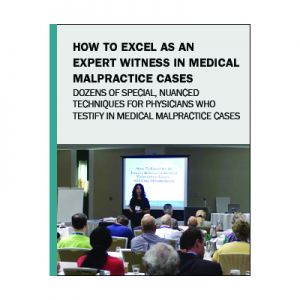Expert witness level of certainty required for medical malpractice causation
Excerpted from SEAK’s Course: How to Excel as an Expert Witness in Medical Malpractice Cases
So when experts are testifying or writing out their opinions on the issue of causation, okay, that opinion’s got to be expressed in terms of probabilities, so you’ve got to use words that don’t convey that you are guessing or that you’re not sure, because saying that there might be a connection, or saying that something is consistent with something else, that is not the adequate language to convey that, more probably than not, the breach is connected to the injury, okay?
Possible…using words like possible, conceivable, reasonable, okay? Words like ‘suggests’, highly suggestive, “Doctor, does that expression ‘highly suggestive,’ does that ring a bell for you?” ‘Highly suggestive’ suggests, okay? “I saw that all over a report you sent to me, right?” When you’re making causation arguments, you’re saying ‘suggests’, it’s highly suggestive, it’s consistent with, that’s not enough.
For causation, you have to say that more probable than not, more likely than not, there is a connection. You’ve got to be in the world of probable. This is why, when you get in front of that jury, your job is to help them decide the facts. If you’re getting up there and you’re guessing, are you helping them? It doesn’t help them when you’re guessing, so that’s the very basic reason why you’ve got to use words of probability, otherwise the judge won’t let you testify. If a judge gets a report that says, “Suggestive of this, suggests this, possibly, may be, could be, it’s conceivable…”

